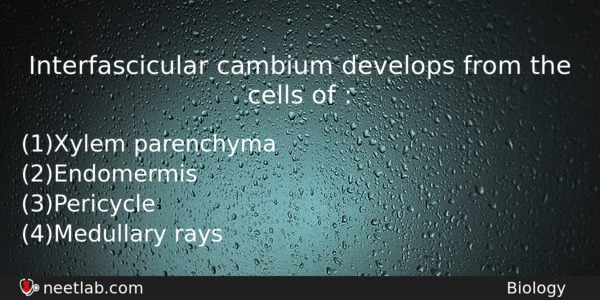| ⇦ | 
| ⇨ |
Interfascicular cambium develops from the cells of :
Options
(a) Xylem parenchyma
(b) Endomermis
(c) Pericycle
(d) Medullary rays
Correct Answer:
Medullary rays
Explanation:
At the time of secondary growth interfascicular cambium is formed by parenchymatous medullary rays. Interfascicular cambium along with intrafascicular cambium (formed from cambium cells present between xylem and phloem) constitute continuous cambium ring. If cut off new cells in both directions cause secondary growth in most dicotyledonous plants
Related Questions: - Alimentary canal contains
- When a potato piece is kept in a concentrated salt solution then
- What is true about the isolated small tribal populations?
- Hysteresctomy is surgical removal of:
- The body of sponges are mainly composed of
Question Type: Memory
(964)
Difficulty Level: Easy
(1008)
Topics: Structural Organisation In Plants
(243)
Subject: Biology
(4253)
Important MCQs Based on Medical Entrance Examinations To Improve Your NEET Score
- Alimentary canal contains
- When a potato piece is kept in a concentrated salt solution then
- What is true about the isolated small tribal populations?
- Hysteresctomy is surgical removal of:
- The body of sponges are mainly composed of
Question Type: Memory (964)
Difficulty Level: Easy (1008)
Topics: Structural Organisation In Plants (243)
Subject: Biology (4253)
Important MCQs Based on Medical Entrance Examinations To Improve Your NEET Score
18000+ students are using NEETLab to improve their score. What about you?
Solve Previous Year MCQs, Mock Tests, Topicwise Practice Tests, Identify Weak Topics, Formula Flash cards and much more is available in NEETLab Android App to improve your NEET score.
Share this page with your friends

Leave a Reply